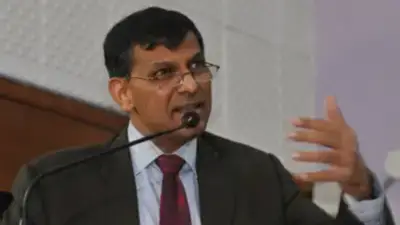India needs to be ‘very careful and clever’ in US trade deal talks, says Raghuram Rajan; flags farm import risk

[ad_1]
India needs to be ‘very careful and clever’ in US trade deal talks, says Raghuram Rajan; flags farm import riskFormer Reserve Bank of India Governor Raghuram Rajan has cautioned that India needs to be “very careful and clever” while negotiating trade agreements with the United States, especially in sectors like agriculture where developed economies provide far more subsidies to their producers.Speaking to PTI, Rajan said India’s economic growth has “sort of settled in the range of 6–7 per cent”, but warned that trade uncertainties — particularly around tariffs and subsidies — could hurt the country’s farmers if not handled prudently.
“I think where it is much more sort of difficult (trade negotiations) is in areas such as agriculture, where every country subsidises its producers, and our producers may be relatively smaller, may have somewhat lower subsidies… unconstrained flow of agricultural products into the country may create problems for them,” Rajan said.His remarks come days after the Indian negotiating team concluded the fifth round of talks for a proposed Bilateral Trade Agreement (BTA) with Washington. US President Donald Trump has said any pact with India will be on the lines of the one signed with Indonesia — a deal that has sparked domestic political concerns in India over demands to open the agricultural and dairy markets.Rajan, now a professor at the University of Chicago Booth School of Business, said that India should explore alternative strategies such as encouraging foreign investment in value-added processing. “Can we encourage more foreign direct investments from those countries to enhance the value added in some of those sectors — the milk for example, sort of improving the value added in our milk products, milk powder, cheese, etc, could be beneficial to our milk producers,” he said.US tariff threats and India’s positioningRajan added that while trade tensions are generally negative for exports and investments, India could gain in relative terms if it is seen as an alternative to other Asian manufacturing hubs affected by US tariffs.“But you must remember that there are opportunities also in what is happening to the extent that India is perceived as an alternative route to some of the other regions like the United States,” he said.India has asked Washington to roll back additional tariffs — including 26% on key goods — and ease steep duties on steel, aluminium (50%) and autos (25%). Trump’s proposed tariffs, first announced in April, were initially delayed to July 9 and are now set to take effect from August 1.Rajan downplayed immediate economic risks from such duties, noting that India’s manufacturing exports to the US are still small. “Any kind of tariffs (on India) will have some modest dampening effect, but not a lot,” he said.India must reverse some protectionismOn India’s own tariff regime, Rajan said that the country has become more protectionist in some areas and urged a rethink.“There are certain areas where India has become more protectionist… certainly we can reverse that protectionism,” he said. “These are areas where India has been historically protectionist, and bringing down the level of tariffs, increasing competition in those sectors can be quite beneficial.”He cited car manufacturing as an example. “We have some advantages. We produce certain kinds of cars very well, and bringing competition in the automobile sector can actually be quite beneficial,” Rajan said.In his view, India’s long-term economic prospects remain strong. While global tariffs may shave off a fraction of growth in the short run, he said, “In the longer term, this would spell opportunity for India.”
[ad_2]
Source link






